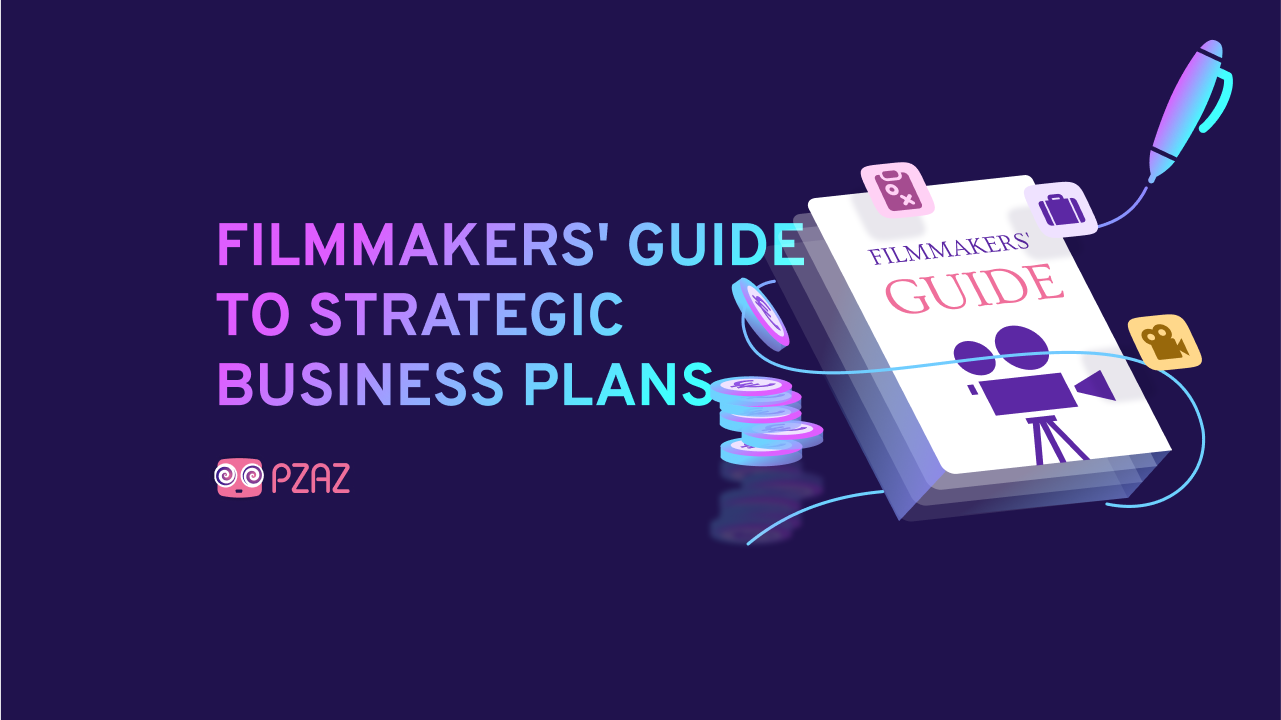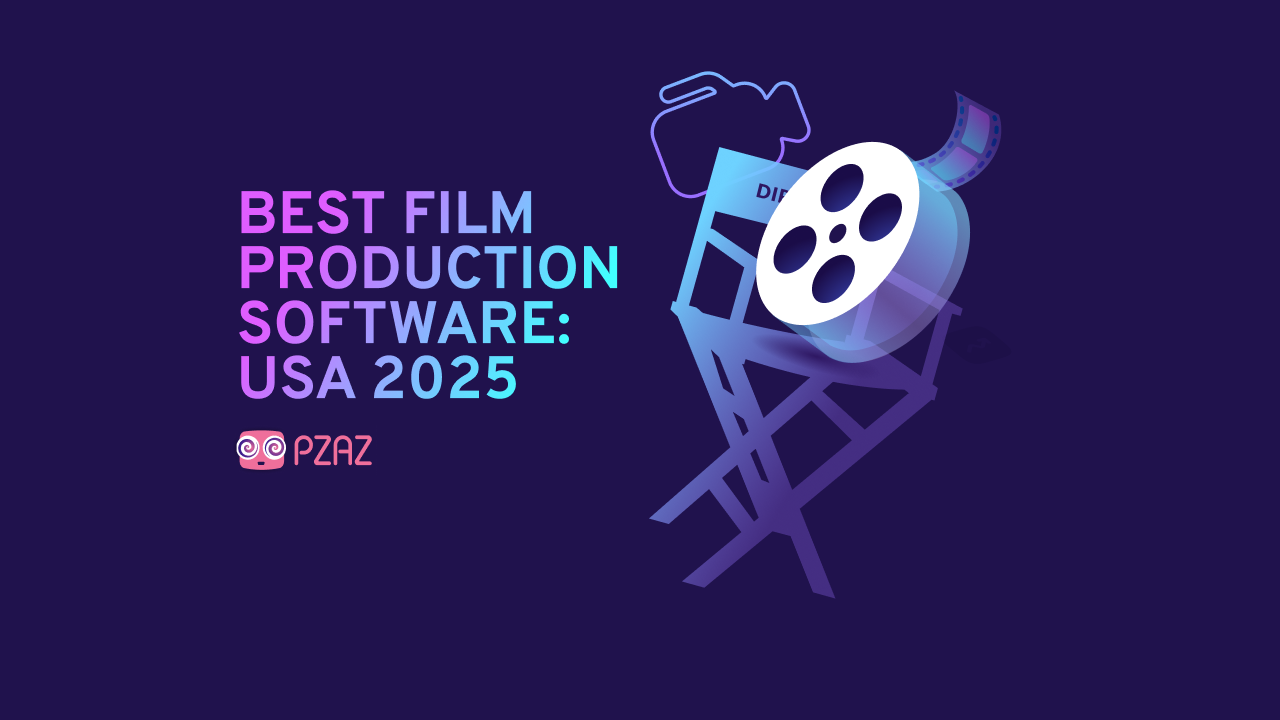Strategic Planning for Filmmakers: Navigating Business Plans for Success

Plan, Pitch, Conquer: Your Guide to Effective Film Business Plans
Navigating the film industry requires more than just creative talent; it demands a strategic approach to business planning. From initial idea to final screen product, filmmakers face numerous hurdles—financing, production logistics, marketing, and distribution. A solid business plan acts as a crucial roadmap through this process, offering a structured way to turn creative visions into reality. This guide breaks down the key types of business plans filmmakers need, emphasising their role in securing funding, budgeting accurately, executing strategic marketing, and ensuring successful distribution. By understanding and applying these planning essentials, filmmakers can significantly improve their chances of not just completing their projects but also achieving recognition and financial success. Let’s dive into the core business plans that pave the way for a film’s journey from concept to audience.
In filmmaking, the bridge between creative ideas and on-screen realisation is built on solid business planning. Every captivating narrative and memorable character is backed by a strategic plan that navigates the project from idea to audience. This article dives into the critical role of business planning in filmmaking, highlighting the plans that guide creators from the initial concept, through the challenges of production and financing, to the final stages of distribution.
One might wonder, why is a business plan crucial for filmmakers? Can’t creativity alone suffice to capture audience attention and make a mark in the film industry? The reality is, while a strong narrative is fundamental, it’s the business plan that ensures a film’s journey is feasible and successful. It acts as a filmmaker’s guide through budgeting, securing funding, marketing, and finding the right distribution paths. It connects the creative vision to the practical aspects of filmmaking, ensuring projects are not only conceived but also effectively executed and brought to market.
This piece examines a range of business plans, from detailed proposals aimed at attracting investment to more specialised strategies for independent films looking to leverage crowdfunding. Whether aiming for a box office smash, an independent gem, or a documentary that sparks change, the right business plan is crucial. We’ll explore how filmmakers tailor these plans to suit their unique project needs, including genre, budget, funding, and distribution strategies, offering a comprehensive look at the tools that turn cinematic dreams into reality. Let’s dive into the world behind the camera and uncover the strategic blueprints essential for film industry success.
Unlocking the Filmmaker Potential: Creating A Solid Business Plan
In the dynamic and competitive world of filmmaking, where creativity meets commerce, the importance of a well-conceived business plan cannot be overstated. From the spark of an original idea to the applause of a captivated audience, the journey of a film project is a multifaceted endeavour that demands meticulous planning, strategic foresight, and a deep understanding of the industry’s financial and distribution mechanisms. Below, we explore the myriad reasons why crafting a detailed business plan is indispensable for filmmakers at every stage of their project’s lifecycle.
Securing Financial Investments
The cornerstone of any film’s journey from concept to screen is financing. A comprehensive business plan serves as a filmmaker’s pitch to potential investors, highlighting the project’s viability, profitability, and artistic merit. For instance, a detailed financial model within the plan can demonstrate the potential return on investment for a feature film by comparing it to similar genre successes, thereby attracting angel investors or production companies. Moreover, platforms like Kickstarter and Indiegogo have shown that a compelling business plan can also persuade the public to contribute through crowdfunding, citing examples like the Veronica Mars Movie Project and Zach Braff’s Wish I Was Here.
Budgeting with Precision
A film’s budget is its financial backbone, dictating everything from the calibre of on-screen talent to the quality of post-production effects. A business plan forces filmmakers to account for every dollar, whether it’s a modest indie project budgeting for guerrilla filmmaking tactics or a blockbuster aligning funds for global marketing campaigns. For example, the production of “Paranormal Activity” leveraged a minimal budget to maximise profit through innovative marketing and distribution strategies, a feat that was meticulously planned and executed.
Strategic Marketing and Distribution
Understanding and identifying the target audience early on enables filmmakers to tailor their marketing and distribution strategies effectively. A business plan outlines how a film will reach its audience, be it through festival circuits, direct online distribution, or traditional theatrical releases. A case in point is the “Blair Witch Project,” which used early internet buzz and a viral marketing campaign to achieve unprecedented box office success against a minimal budget.
Project Management and Timeline
Filmmaking is a complex process that involves coordinating numerous moving parts, from pre-production tasks like casting and location scouting to post-production activities such as editing and scoring. A business plan establishes a project timeline, setting realistic milestones and deadlines. This ensures a smooth production process, timely completion, and, ultimately, a successful release. Peter Jackson’s “The Lord of the Rings” trilogy stands as a prime example of exceptional project management, with detailed planning allowing for the simultaneous filming of all three movies.
Assessing Feasibility and Risks
Not every film idea is destined for the big screen. A business plan helps filmmakers evaluate the feasibility of their project, considering factors like market trends, audience demand, and competitive analysis. It also prompts the identification of potential risks and the development of mitigation strategies, ensuring that filmmakers are prepared for challenges that may arise. The eventual success of niche films like “My Big Fat Greek Wedding” showcases the importance of understanding market demand and strategically planning production and marketing to cater to specific audiences.
Legal and Licensing Matters
Filmmakers must navigate a maze of legal considerations, from securing rights to music and copyrighted materials to negotiating contracts with talent and crew. A business plan includes provisions for these legalities, ensuring that the project does not encounter preventable hurdles. The careful licensing of music in “Guardians of the Galaxy” exemplifies the impact of well-managed legal arrangements on a film’s reception and success.
Long-term Strategy and Vision
For filmmakers envisioning a series or franchise, a business plan lays the groundwork for future instalments, setting the stage for a saga that can captivate audiences over the years. It outlines the long-term vision, potential spin-offs, and merchandising opportunities. The Marvel Cinematic Universe (MCU) is a testament to the power of strategic long-term planning, with a clearly mapped-out phase structure that guides its storytelling and production decisions.
Building Credibility and Trust
A robust business plan enhances a filmmaker’s credibility when engaging with industry stakeholders, from producers and distributors to financiers and talent. It signals professionalism, dedication, and a serious commitment to bringing the project to fruition. The confidence investors placed in Christopher Nolan’s vision for “Inception” was partly due to the thoroughness of the planning and the clarity of the project’s artistic and commercial ambitions.
In conclusion, a film business plan is much more than a financial document; it is a strategic tool that guides the filmmaking process from inception to distribution. It addresses crucial aspects such as funding, budgeting, marketing, and legal considerations, ensuring that filmmakers are well-prepared to navigate the complexities of the film industry. By meticulously planning and articulating their vision through a business plan, filmmakers can increase their project’s chances of success, both artistically and commercially.
Streamlining Filmmaker Success: Different Business Plans for different films
Film-makers can utilise various types of business plans depending on their project’s nature, scale, and intended audience. These plans not only help in securing funding but also guide the project from conception through distribution. Here are some common types of business plans for filmmakers:
Traditional Business Plan for a Feature Film
This comprehensive document is designed for seeking investment or loans, outlining the film project in detail. It includes market analysis, budget, marketing strategies, potential revenue streams, and a detailed schedule. This type of plan is often used for larger projects requiring significant funding. Let’s take a look at a comprehensive example.
Film Example: “Echoes of Tomorrow”
Concept Overview: “Echoes of Tomorrow” is envisioned as a gripping drama set against the backdrop of early 20th-century America, exploring the interconnected lives of two families as they navigate the complexities of love, loss, and ambition over decades. This feature-length film aims to blend historical accuracy with emotional depth, creating a narrative that resonates with contemporary audiences while paying homage to the era’s cinematic style.
Objective: The goal is to produce a visually stunning and emotionally compelling drama that appeals to both critics and audiences, achieving success in theatrical releases and finding a second life in streaming platforms. The film seeks not only to entertain but also to provoke thought and conversation about the themes it explores.
Budget Breakdown: A projected budget of $5 million is allocated, covering all stages from pre-production research, securing period-accurate locations, costume design, casting, and securing a director known for their visionary storytelling. The budget also includes funds for post-production processes such as editing, score composition, and marketing.
Cast and Crew: The business plan lists targeted actors who can bring depth to the complex characters within the narrative, alongside a director whose past work has garnered critical acclaim in the drama genre. Key crew positions are filled by professionals with proven experience in creating period pieces, ensuring authenticity and quality.
Marketing and Promotion: A multi-phased marketing strategy is outlined, starting with a teaser campaign that introduces the main characters and setting, followed by a full trailer release. Social media campaigns will leverage platforms like Instagram and Twitter to share behind-the-scenes glimpses and historical facts related to the film’s setting, engaging potential audiences early. Traditional advertising will include billboard placements in key cities and promotional spots in cinemas. A targeted film festival run is planned to build prestige and buzz before the wide release.
Distribution Strategy: The plan targets a strategic theatrical release in major cities, followed by an expansion to art-house theatres. Negotiations with streaming services for a distribution deal post-theatrical run are outlined as a key revenue stream, ensuring the film’s accessibility to a wider audience. Revenue projections are based on comparative analysis with similar films, accounting for ticket sales, streaming rights, and international distribution.
Revenue Projections: By analysing box office performances of similar dramas, “Echoes of Tomorrow” is projected to generate substantial returns, with a detailed breakdown of expected earnings from domestic and international markets. The business plan includes a contingency for reinvestment in marketing should initial performance exceed expectations.
Production Timeline: The plan details a comprehensive timeline, from initial development, casting, and location scouting, through to shooting, post-production, and the premiere. Each phase has allocated timeframes and milestones, ensuring the project remains on schedule and within budget.
This business plan for “Echoes of Tomorrow” encapsulates the filmmaker’s vision for a feature film that combines historical drama with rich storytelling, outlining a clear path from concept to screen. It demonstrates the meticulous planning and strategic foresight required to bring a cinematic vision to life, ensuring both creative success and financial viability.
Short Film Business Plan
Tailored for short films, this plan focuses on the essentials such as a brief synopsis, budget, marketing, and distribution strategy. The goal is often to showcase talent or gain recognition rather than significant profit, hence the plan might also detail festival submissions and potential screenings.
Short example:
Consider a filmmaker aiming to produce a 15-minute short film that tackles social issues, with aspirations of showcasing it at international film festivals and online platforms. The business plan for such a project might propose a budget of $20,000, secured through a mix of crowdfunding campaigns on platforms like Kickstarter, alongside grants specifically aimed at supporting short films. Marketing strategies could leverage social media platforms, leveraging teasers and behind-the-scenes content to generate buzz. The distribution strategy would prioritise submission to both local and renowned international film festivals, such as Sundance or Cannes’ Short Film Corner, complemented by a release on Vimeo or YouTube for broader audience access.
Documentary Business Plan
Similar to traditional plans but tailored for documentary projects, focusing on the subject’s importance, potential impact, and audience interest. It includes research, development plans, funding sources (including grants and crowdfunding), and distribution strategies that might involve educational markets or streaming services.
Short example:
Imagine a documentary project exploring the impact of climate change on small island nations. The business plan for this endeavour would detail its significance to environmentalists and educational institutions, aiming for a budget of $100,000 funded by environmental grants, donations from NGOs, and a targeted crowdfunding effort. The distribution plan might include partnerships with streaming services known for documentary content, like Netflix or National Geographic, as well as a targeted outreach to universities and environmental organisations for educational screenings, supplemented by appearances at environmental film festivals worldwide.
Independent Film Business Plan
Designed for indie filmmakers, this plan emphasises creativity and cost-efficiency. It outlines the project’s uniqueness, budget considerations, funding sources (often including crowdfunding or angel investors), and innovative distribution methods such as direct-to-consumer platforms.
Short example:
An indie filmmaker dreams of producing a horror film that subverts genre tropes, with a script that necessitates a $250,000 budget. This plan would likely detail funding sourced from angel investors attracted to innovative film projects and a Kickstarter campaign offering exclusive behind-the-scenes access. Marketing could focus on guerrilla tactics and a social media campaign highlighting the film’s unique approach to horror, aiming for distribution through indie film festivals like SXSW or Tribeca, followed by negotiations with streaming platforms for wider distribution, leveraging the film’s festival success as a selling point.
Film Series or Franchise Business Plan
Used for projects intended as series or franchises, this plan outlines the overarching narrative, episodic structure (if applicable), budget for multiple instalments, and a marketing strategy that builds a fan base over time.
Short example:
For a filmmaker envisioning a trilogy of science fiction films exploring themes of artificial intelligence and humanity, the business plan would project the budget for each instalment ($10 million, $12 million, and $15 million, respectively), emphasising the overarching narrative’s potential to attract a loyal fanbase. Marketing strategies include a mix of traditional media and digital platforms, aiming to engage audiences between releases through social media, merchandise, and interactive online content. Revenue projections consider box office returns, streaming rights, and merchandise sales, with plans to reinvest profits into subsequent instalments, ensuring the trilogy’s financial and creative success.
Commercial or Corporate Film Business Plan
Focused on films produced for commercial or corporate purposes, this plan highlights the project’s objectives (e.g., advertising a product, corporate training), budget, target audience, and distribution channels.
Short example:
A series of corporate training videos designed to enhance employee skills and company culture might require a business plan detailing a production budget of $5,000 per video. The target audience would be the company’s employees, with distribution planned through the company’s intranet or dedicated training platforms. The plan would also include metrics for measuring the videos’ effectiveness in improving performance and engagement, highlighting the project’s value to corporate stakeholders.
Crowdfunding Campaign Plan for a Creative Project
While not a traditional business plan, a crowdfunding campaign requires careful planning. It includes a pitch video, rewards for backers, marketing strategy to reach potential supporters, and budget detailing how funds will be used.
Short example:
Envision a filmmaker preparing to create an experimental film that blends animation with live-action to explore themes of identity and transformation. The crowdfunding campaign plan would outline a unique proposition to potential backers, seeking a $50,000 budget. Rewards could range from digital downloads to limited edition art prints and private screening invitations. The marketing strategy would leverage social media platforms, influencer partnerships, and film enthusiast forums to build anticipation and community around the project, with a detailed timeline ensuring milestones are communicated and met.
Distribution-focused Business Plan
For projects where distribution is a primary concern, this plan focuses on securing distribution channels, whether through festivals, online platforms, or traditional cinema distribution. It includes marketing strategies and potential revenue projections based on different distribution methods.
Short example:
A documentary delving into the world of competitive board gaming might identify a niche but passionate audience. The business plan would focus on securing distribution through streaming services catering to hobbyists, board game convention screenings, and direct sales to board game cafes and stores. Marketing strategies would be tailored to engage the board gaming community, with projections of sales at various price points. Partnerships with board game publishers for cross-promotion could expand reach and enhance the film’s appeal to its targeted audience.
Reeling in Success: The Final Cut on Film Business Planning
In the intricate dance of filmmaking, where artistry meets the rigors of the marketplace, mastering the craft of business planning is not just beneficial—it’s essential. From the spark of an original idea to the glow of the silver screen, each step requires careful consideration, strategic foresight, and a commitment to turning visionary concepts into tangible successes. This guide has navigated the crucial avenues of film business planning, shedding light on the diverse strategies filmmakers must adopt to secure funding, manage budgets effectively, execute impactful marketing, and ensure broad distribution.
As we’ve explored, whether it’s the traditional approach for feature films, the grassroots route for short films, or the innovative paths for documentaries and indie projects, a well-crafted business plan is the cornerstone of any successful film project. It’s the blueprint that guides filmmakers through the tumultuous journey of production, the compass that directs marketing efforts, and the map that leads to fruitful distribution channels.
Remember, a film without a business plan is like a ship without a rudder, drifting aimlessly in the vast ocean of content. By applying the insights and strategies discussed, filmmakers can steer their projects with confidence, navigating the choppy waters of the film industry to find their audience and achieve both critical and commercial success. So, as you embark on your next cinematic adventure, arm yourself with a solid business plan, and let it be the guiding light that transforms your creative vision into a cinematic reality that captivates audiences around the globe.
In conclusion, the art of filmmaking is as much about strategic planning and execution as it is about creativity and storytelling. By embracing the principles of business planning, filmmakers can unlock their full potential, ensuring their projects not only take flight but also soar high in the ever-competitive film industry. Here’s to your success in crafting stories that not only dream big but also achieve big, leaving a lasting impression on the hearts and minds of audiences
Film Task Management Statistics: USA 2025
Discover key film task management statistics from 1,063 independent US filmmakers in 2025. Learn how they handle deadlines, tools, team updates, and task dependencies to keep productions on track.

 SCRIPTWRITING
SCRIPTWRITING STORYBOARDING
STORYBOARDING SCENE BREAKDOWN
SCENE BREAKDOWN SHOT LIST CREATION
SHOT LIST CREATION CREW & CAST MANAGEMENT
CREW & CAST MANAGEMENT COLLABORATION TOOLS
COLLABORATION TOOLS PRODUCTION & SCHEDULING
PRODUCTION & SCHEDULING FILE SHARING & MEDIA STORAGE
FILE SHARING & MEDIA STORAGE
